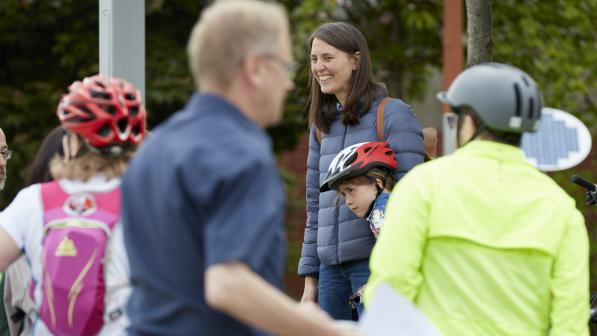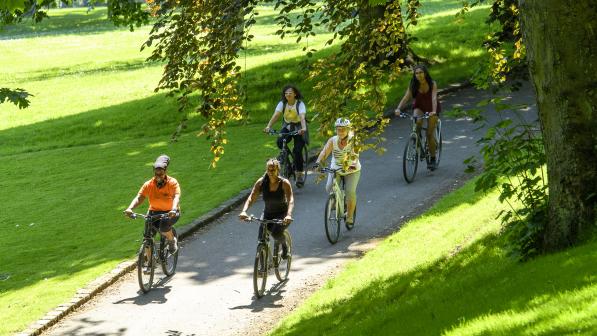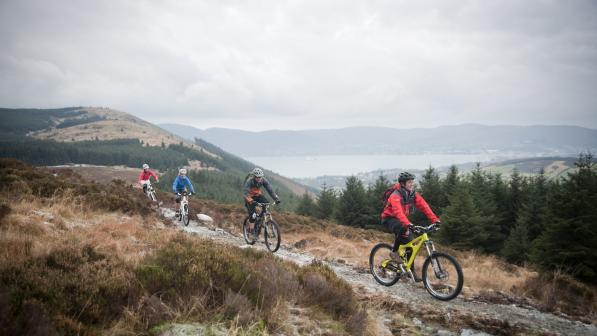Can politics really change how many people choose to cycle in Northern Ireland?

On 5 May this year, against the backdrop of a political crisis, climate crisis, and a cost-of-living crisis, the people of Northern Ireland will elect 90 Members of the Legislative Assembly (MLAs) to the Northern Ireland Assembly. These candidates will represent our wide-ranging communities and cultures.
Cycling UK believes getting more people walking, wheeling and cycling needs to be a key commitment for each and every party and candidate, so we'll be asking them to pledge to champion active travel, and enable local changes through national policy.
It would be a positive step towards solutions to many of the issues we are facing, and one of the rare proposals that should unite everyone across the political spectrum.
When you crunch the numbers from places that have made active travel a priority, it’s impossible to ignore the positive impact both on people's lives, but also the public purse.
We want you to sign our petition to call on the parties to commit to make this happen.
Not everyone who cycles is a cyclist
In Northern Ireland, we have a particular perception of ‘cyclists’ as lycra-clad individuals, or groups riding bikes that you could lift with your little finger who cycle for pleasure.
People cycling for leisure is no bad thing, and it’s great to see so many people out exercising in a sustainable way. But spend just a few minutes on part of the (admittedly small) network of greenways or watching the (admittedly short) Dublin Road cycle lane and you will notice people cycling who don’t fit this mould. These are people simply trying to get from A to B as safely and efficiently as possible. They may be someone delivering your food, they could be your children’s teacher getting to work, or your anaesthetist on their way to your operation.
These people are benefiting society in three major ways:
- They are reducing car traffic on our roads, with all the added benefits of this; less pollution, reduced CO2 emissions, lower congestion, more road space for all.
- They are healthier than if they were driving, both physically and mentally. They will take fewer sick days, will need less healthcare support over their lives and they will be happier and more productive when at work.
- They are making our communities more liveable, taking up less space when parking, spending more in the local economy and are more likely to socialise in their local area.
Northern Ireland has the potential to see many more ‘people who cycle’ for everyday journeys on a connected and safe cycle network; 'people who cycle' to the train station and either lock their bike in a secure space, or take it with them for the other end of their journey: people who can be confident to encourage their children and grandchildren to cycle to school or to see friends, creating a generation of people who aspire to get somewhere by cycling.
The last two years have felt like change is in the air. The Department for Infrastructure created a ‘Blue-Green Infrastructure Fund’, the minister had announced a record (for Northern Ireland at least) spending commitment for active travel, and the ‘Belfast Bicycle Network’ plan was published.
Sadly, this change seemed mostly to stay in the air, with little to no connected safe cycle paths built throughout the pandemic, and a fight to keep the small temporary gains that have been made.
Our manifesto
Our manifesto calls for progress in three key areas in order to drastically increase the number of people who cycle:
- Invest and prioritise active travel – The Assembly needs a change in resource allocation, attitudes and accountability. We feel the best way to achieve this is through an Active Travel Act which would require our MLAs to prioritise active travel in all infrastructure schemes. To back up the Act we are also calling for funding for active travel to increase to the same levels as Scotland, which has 10% of the transport budget.
- Make it safe for everyone – We want people, whether they are eight years old or 80, to feel it is safe to cycle from their door to their work, school, shop or leisure activity. Of course, long-term investment is required for a connected network of safe cycle paths, but there are also shorter-term measures Stormont can take which will make our streets safer and nicer to live in. We support the introduction of 20 mph as the default speed limit around schools and are calling for this to be expanded to streets where people live, enabling children to cycle to school and reducing the reliance on the car for all. In rural areas, we are calling for the introduction of a 40 mph speed limit on single lane carriageways for all vehicles, making our vast network of rural streets safer for all road users.
- Connect our neighbourhoods to make them attractive, people-focused spaces – We want our representatives to enable people to make door-to-door journeys without depending on a car. This means we need to improve cycle access and parking at train stations and increase cycle spaces on trains.
We also need to deliver the connected network of safe cycle lanes built to the highest design standards, future-proofing them for the increased number of users we want to see.
What you can do
If you agree with us and want to add your voice to our call for progress, then please sign our petition and together we can send a message to the candidates that we want them to make it happen.
To get involved further you can also become part of our Cycle Advocacy Network which is a growing group of individuals and clubs working towards improving cycling for everyone across the UK.




